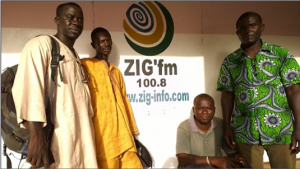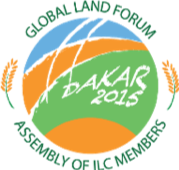First published on 05/29/2015, and last updated on 03/29/2018
By: Grazia Borrini-Feyerabend, Global coordinator, ICCA Consortium
With representatives of Consortium members ANGOC, Forest Peoples Programme, Maliasili Initiatives and PAFID, the Consortium President and Global Coordinator attended the 2015 Global Land Forum in Dakar (Senegal) on 12-16 May, 2015 and animated a side event on ICCAs and Land Rights. The theme for this year’s forum— Land Governance for Inclusive Development, Justice and Sustainability: Time for Action— gathered grassroots organizations, local and international NGOs, multilateral organizations and government agencies from around the world. The event was largely dedicated to the situation of land rights and governance practices in Africa and included, among others, sessions on indigenous land rights, family farming, women’s rights and community-based monitoring and information systems.
Prior to the event, the Consortium had submitted a proposal to become a member of the International Land Coalition (ILC, the event organizer), a fact that was encouraged and supported by some of our members but considered unwise by an honorary member who thoughtfully raised the issue in the Consortium mailing list. He pointed to the fact that ILC was established by, and is hosted within, the International Fund for Agricultural Development (IFAD) — a UN agency criticised for offering undue privileges to its staff and supporting questionable projects. In this situation, one may think that ILC provides a fig leaf of appropriate ‘discourse’ while IFAD continues to back-up the global economic status quo and neoliberal policies that disadvantage the poor. It was mentioned that Consortium members may not have reflected enough about the idea of the membership and that it could have waited for ILC to leave IFAD before engaging as an affiliate. It was stressed that the Consortium has an important “radical standing” to defend and that civil society organizations associated with UN agencies run the risk of becoming domesticated, uncritical and ineffective.
At the time of the debate, the Consortium had already applied for ILC membership (decision approved by the Steering Committee but not submitted for advice to the whole membership). It had also openly expressed a clear intention not to be a passive member in the ILC rank and file, but to champion and expand three relatively new dimensions of work in the coalition:
- collective/ communal rights to land, water and natural resources (not only individual or family farmers’ rights)
- collective/ communal responsibilities and capacities to conserve land, water and natural resources
- ICCAs as a strategic additional argument towards securing and/or strengthening land, water and natural resource tenure
How did it go at the Global Land Forum? While the overall emphasis was on individual or family farmers (e.g. about their access to land, the farmers’ capacity to invest, the value of titling land to women, engaging youth, etc.), some of the panellists and speakers did mention the dangers of a colonialist mindset that sees land as private goods for the market and agribusiness versus as an essential necessity for livelihood, identity and culture. The limitations of legal and institutional reforms were stressed, as were the ever-present risk of corruption and the need for transparency and accountability. There was also a session on the “global call for action” for community land rights, and a panellist mentioned the need to link land tenure with local anthropological history, recognizing the complexity of negotiations engendered by this approach.
The Consortium participated in all the main sessions of the Forum and held a side event (“Conservation capacity, commitment and results strengthen collective land rights”) that showcased experiences of IPs/LCs from the Philippines, Kenya and Iran who advocated for communal land, water and natural resource rights on the grounds of their own conservation capacity, commitment and results. A panel of land rights specialists provided comments and insights… and the participants’ discussion went on much later than the time allotted.

Participatory radio programs on ICCA topics in local language supported by the ICCA Consortium in Casamance, Senegal © Gbf
Besides the side event, the Forum provided excellent occasions to have a “feel” of ILC (…many engaged and vocal members, an approachable director, showcase initiatives that respond to the priorities of the Consortium…) and to meet with some of our own members and partners in Senegal. For instance, conversations were held with GEF SGP Senegal and IUCN Senegal on possible forthcoming GSI initiative there, and with Maliasili Initiatives on their willingness to engage in facilitating the drawing up of a long-term strategy for the Consortium. It seemed to us that the risk of being co-opted could be avoided by remaining watchful while engaging proactively with ILC to strengthen the aspects closest to our mission. Finally, we took advantage of the travel to offer assistance to the Consortium’s West Africa Coordinator, our member APRCM and our partner KABEKA in the Casamance region of Senegal, where the Consortium is currently supporting participatory radio programmes on ICCA topics in the local language.
In June 2015, we received the ILC reply to our membership application (accepted!), and our Steering Committee confirmed it, stressing that the goals of ILC are close to the spirit and work of the Consortium. Noticeably, in fact, ILC is committed to “Recognizing and protecting the diverse tenure and production systems upon which people’s livelihoods depend, including the communal and customary tenure systems of smallholders, indigenous peoples, pastoralists, fisher folks, and holders of overlapping, shifting and periodic rights to land and other natural resources, even when these are not recognized by law…” as well as “Respecting and protecting the inherent land and territorial rights of indigenous peoples, as set out in ILO Convention 169 and the UN Declaration on the Rights of Indigenous Peoples…“. In addition, ILC has vowed to “…empower local land users and their communities with the authority, means and incentives to carry out territorial and ecosystem management…”, to “…prevent and remedy land grabbing, respecting traditional land use rights and local livelihoods…” and to “…respect and protect the civil and political rights of human rights defenders working on land issues…”.
Concretely, how do we propose to collaborate? What kind of initiatives can we expect to mutually benefit from? Here are a few ideas. ILC is a larger and older organization than the Consortium, with a membership that overlaps in terms of key interests and concerns (please see their web site here). The Consortium Coordinators in each world region should explore the local ILC membership as a pool of civil society organizations with similar concerns, with whom to communicate and collaborate. They may also wish to review the structure, operations and Global Strategy of ILC to draw information and lessons. In addition, ILC is much better equipped than the Consortium in terms of financial resources and our Members who attended the meeting in Dakar confirmed that one of the benefits of being an ILC member is access to financial resources for land rights initiatives. Last but not least, we could collaborate on the initiative to set up a Solidarity Fund for the Defenders of the Commons and ICCAs, as recently discussed with the ILC Director.
In the light of the important debate raised by our honorary member, we need to remain vigilant and set on our mission. Belonging to ILC, however, offers added opportunities to the members of the Consortium, which we already appreciate. Please participate in the debate, if you wish, by sending your comments to Grazia
